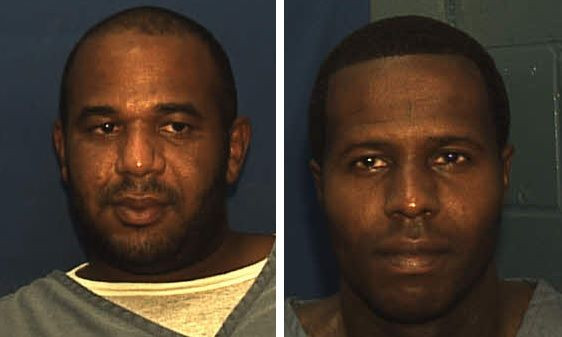
Two convicted murderers walked out of Florida prisons in late September and early October thanks to fake release papers. A manhunt is on for Charles Walker and Joseph Jenkins, both 34, who walked out of prison on Oct. 8 and Sept. 27, respectively, after paperwork bearing the forged signature of Ninth Circuit Chief Judge Belvin Perry was sent to the Department of Corrections. "It is quite evident that someone had some knowledge of the judicial system and how the judicial system operates," said the judge. Perry presided over the highly publicized trial of Casey Anthony in 2011. His signature is widely available on public documents and easily accessible online. "I think it was lifted off another document and placed on that document which is not hard to do," he said.
Jenkins, 34, was found guilty of first-degree murder in the 1998 killing and botched robbery of Roscoe Pugh, an Orlando man. Walker, 34, was convicted of second-degree murder in a 1999 slaying in Orange County. He told investigators that 23-year-old Cedric Slater was bullying him and he fired three shots intending to scare him. State Attorney Jeffrey Ashton said he learned Jenkins had been released when Pugh's family contacted his office. They reviewed the paperwork and found that it was a fake, then notified law enforcement. They also discovered Walker’s release documents were fake. "It is now clear that the use of forged court documents to obtain release from prison is an ongoing threat which all law enforcement, prosecutors, judges, court clerks and prison officials must address and stop," Ashton said.
Florida's governor is calling the manhunt everyone's top priority. "First thing you do when something like this happens - let's solve the problem at hand. I mean we need to apprehend these individuals and that's what we're working on," said Governor Rick Scott. "They have the advantage of time and planning, this is not a scheme that they dreamed up overnight so they might have had an exit plan that took them out of the zone," CBS News senior correspondent John Miller said. However, Miller also explained that the next step would to be to start looking at their circle of associates to see who visited them, who called them and who these men socialized with inside and outside of the prison. "Then you start to squeeze that social network so that people they've contacted or may have contacted feel heat and people they may turn to later may not want to help them."
Misty Cash, a spokesperson for the Florida Department of Corrections, explained: "We initiated our typical procedure for an inmate release. The department followed our procedures and protocols to the letter. So in this instance the department didn't do anything wrong." "I don't know if we'll ever be able to determine where these pieces of paper came from," says Leesa Bainbridge, spokesperson for the Orange County Clerk of Court, the office through which the paperwork was routed. "We have thousands of pieces of paper coming through this office, there's no way to backtrack and say whether this was mailed in, faxed, or left in a dropbox." Bainbridge said officials in the clerk's office plan to talk about what measures, if any, can be put in place to make sure something similar doesn't happen again. "This is something we take very seriously," she said.
© 2025 Latin Times. All rights reserved. Do not reproduce without permission.





